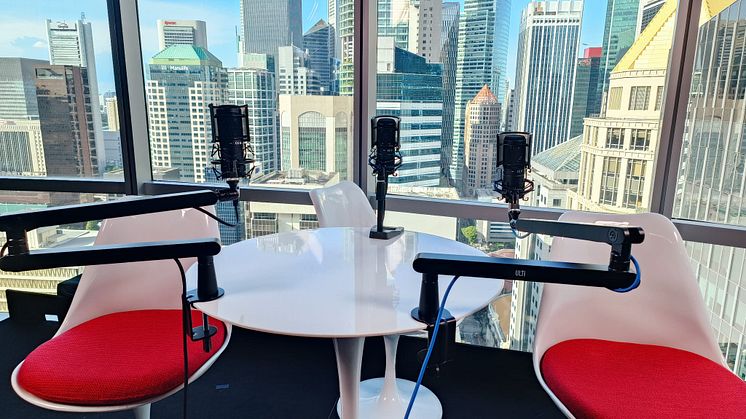
Blog post -
Five costly errors to avoid when starting your own podcast
Podcasts have emerged as the platform for corporate storytelling, but they demand a distinct approach.
We have held four workshops for podcasting skills, and these are five key points we hammer down.
1. Remarkable Guests Saying Remarkable Things in Remarkable Places
“The average attention span of the modern human being is about half as long as whatever you're trying to tell them.”
This quote by American writer Meg Rosoff is why we tell participants that their podcasts need to be remarkable. To attract attention, it needs to feature remarkable guests saying remarkable things in remarkable places.
The essence of a compelling podcast lies in fresh perspectives and engaging narratives. Why would the audience continue listening if you’re saying things they’ve already heard?
2. Not just sound but also video
Long gone are the days when podcasts were just audio. These days the most popular podcasts are in video form.
So why stop at merely recording sound? Find new and interesting filming locations that demand your audience’s attention. If your podcast matters, you need to prove it by doing something remarkable.
3. Frequent but Not Regular
Let's say you've determined to publish your podcast Tuesdays at 10am.
There will be Monday mornings when you don't yet have a podcast guest, or you don't have a very interesting topic to talk about.
When you then publish your podcast on Tuesday morning, chances are, you're going to feature some bottom of the barrel story which really isn't remarkable. Your audience listens to the podcast, finds it is unremarkable and doesn't finish listening, or worse, doesn't listen to it again.
So in short, keeping a rigid schedule is admirable but don’t do it at the expense of delivering valuable and interesting content.
The goal should be for frequent episodes. Have a podcast episode when you have something to say, don’t constrain yourself to arbitrary deadlines.
4. Strategic Questioning
In her podcast interview with the infamous Titus Low, Natasha Ann Zachariah wastes no time to get to the juiciest questions.
“A lot of people were using [OnlyFans] to do sex work, why did you think that was something you wanted to do as well?”
“What do your parents think about it?”
It’s unbiased, good journalism. Natasha has a keen eye for crafting questions that spark meaningful dialogue and uncover hidden gems but most importantly: it’s entertaining.
When you become a podcaster you must treat yourself like a journalist. No one wants to listen to PR pap, so you must have a journalistic view.
5. Studio-Free Philosophy
When you are venturing into podcasting, building your own studio might sound like a good idea.
You might think that in-sourcing podcast production can help save money, but you soon discover there is a reason why camera crew, sound recordists, editors, and so on, charge the amounts they do.
Here are five important points to consider before you build one of your own:
- Design. Recently I visited an office undergoing renovations where the tenant had decided to add a studio in an upstairs area overlooking a warehouse. A brightly lit logo was mounted on the wall at the far end. But the logo was below the eye line. This meant the camera had to be positioned at a high angle so it could be seen over the presenter’s shoulder, and even then, the company logo was so far away it was barely visible on screen. Besides, the ceilings were so low this angle and decent lighting was difficult to achieve. The second studio was so small it could not comfortably accommodate a host and a guest. Its only use might be that of a voice-over booth, but even then, it would require significant investment in soundproofing. Both studios will likely turn into broom cabinets.
- Skill. The skill required to produce podcasts commensurate with your brand is significant and is usually not to be found in-house at companies. Are you willing to hire somebody full time or freelance to plan, host and edit the podcast on a daily or near-daily basis? Otherwise, your podcast studio will likely turn into a broom cabinet.
- Priorities. When people start out producing podcasts it sits at the top of their priority list. They commit themselves and key spokespeople to producing a regular show. But it is difficult to build momentum. Perhaps the spokesperson is on leave or travels frequently, and it becomes impossible to maintain the cadence of production. Before long, recording a podcast episode slips below other items on the priority list. The studio is used less and less, and it turns into a broom cabinet.
- Cost. Studio equipment is certainly much cheaper now than it was 10 or 20 years ago. You can achieve a pretty good effect with prosumer lights, mikes and cameras. But they don't hold their value well. They become obsolete very quickly, and the depreciation curve is steep. The studio soon becomes a very expensive broom cabinet.
- Return on investment. For most companies, the path to revenue from content is very murky. There seems to be very little correlation with any sort of financial return. This might work well for a year or two, but before long other items in the budget are prioritized and the studio turns into a broom cabinet.
Incorporating these strategies will transform your podcast from ordinary to extraordinary. By focusing on remarkable content, frequent yet meaningful episodes, strategic questioning, and avoiding the pitfalls of in-house studios, you can build a compelling and successful podcast that stands out in a crowded market.

